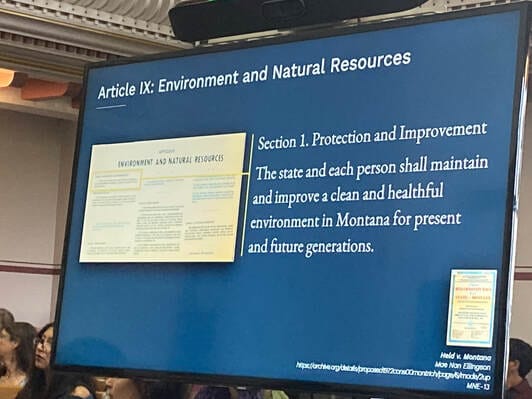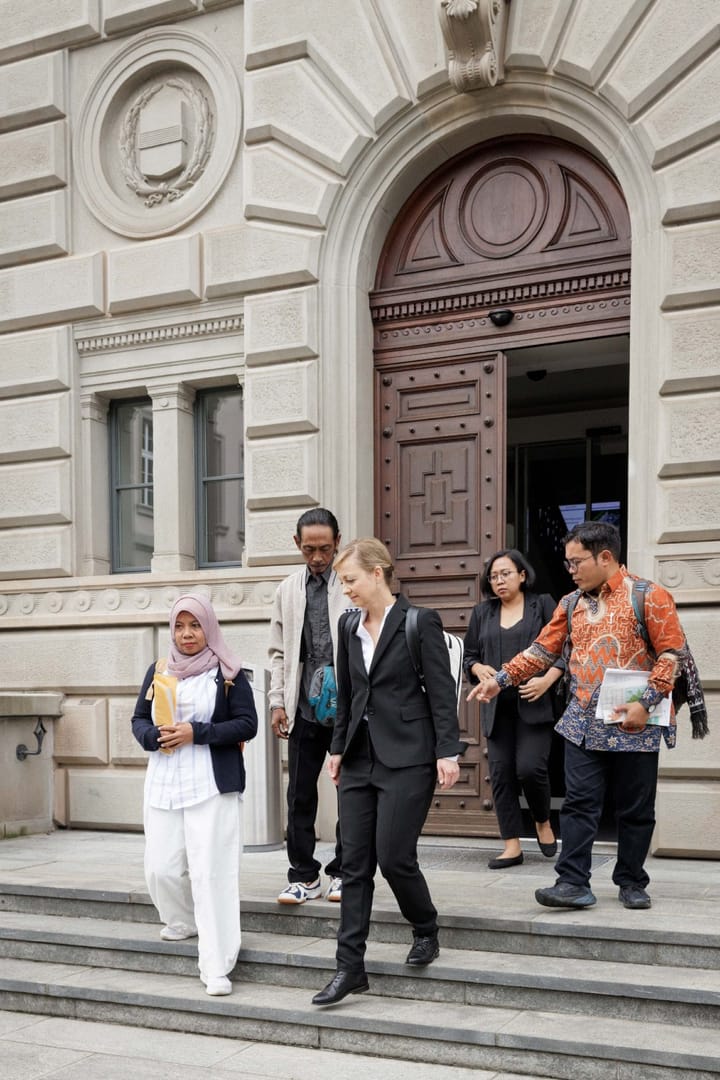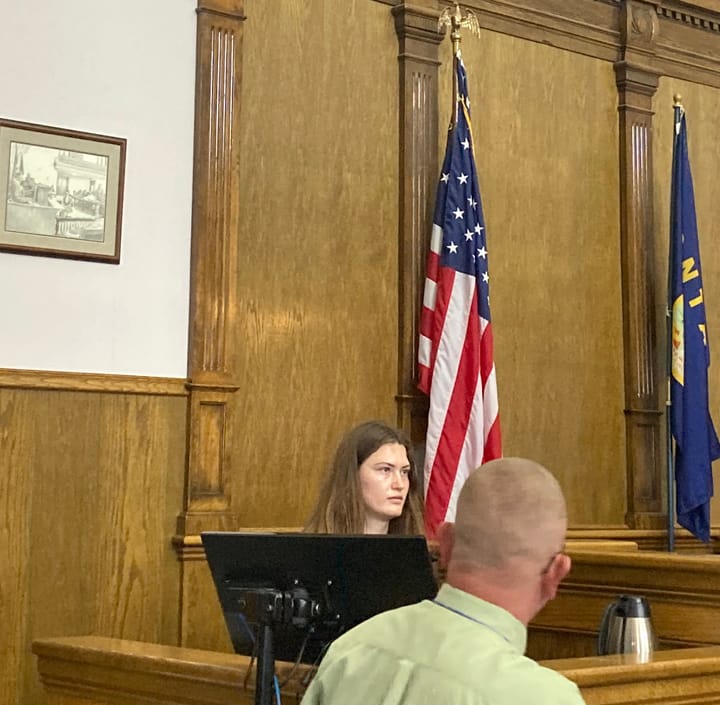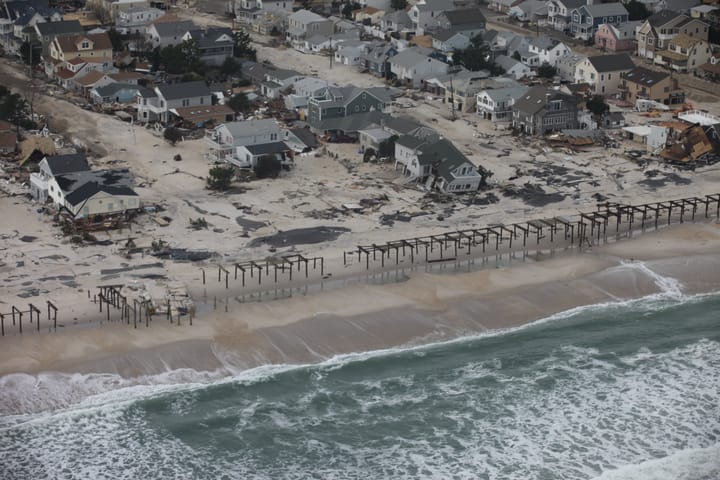Historic Climate Trial Kicks Off: Young Montanans Suing State Take The Stand In First-Ever US Kids' Climate Change Trial

Sixteen young Montanans suing their state government in a groundbreaking climate lawsuit made history on Monday when trial began in their case - the first of its kind in the U.S. to reach the trial stage. It is the first youth-led climate case in the country to go to trial, and first US climate trial in a case grounded in constitutional claims.
The Held v. State of Montana case, filed in 2020, alleges that Montana is harming its youngest citizens by promoting and perpetuating a fossil fuel-based energy system that worsens climate change, which is having devastating impacts across the state – from more severe floods and fires to intensifying heat and drought and rapidly melting winter snowpack and glaciers. The case seeks a court order declaring the state’s conduct, particularly a provision in the Montana Environmental Policy Act banning the state from even considering climate impacts in permitting decisions, to be in violation of Montana’s constitution.
That constitution enshrines the right to a “clean and healthful environment for present and future generations;” it also references the state’s spectacular landscape in its preamble and it uniquely and explicitly extends fundamental rights, including the environmental right, to the state’s youth (persons under age 18). These constitutional protections have been in place for half a century, yet the climate crisis threatens to unravel them, the youth lawsuit contends.
“Because of the now unstable climate system caused by fossil fuel generated greenhouse gases, Montana’s environment is neither clean nor healthful,” Roger Sullivan, an attorney with the Montana-based firm McGarvey Law, said during plaintiffs’ counsel opening statement.

Montana’s constitutional guarantee of the right to a clean and healthful environment dates back to 1972 – when the state drafted a new version of its foundational legal document. One of those drafters was in the courthouse testifying about that historic moment and the significance of adopting what the framers intended as the strongest environmental protections out of any state constitution in the US. At age 24, Mae Nan Ellingson was the youngest delegate elected to the state’s 1972 constitutional convention. She told the court that environmental protection was one of her top priorities in running for the position. Not only did this issue make it into the new constitution as part of a distinct Article (Article IX), but it also was prioritized under the list of inalienable rights (Article II, Section 3) and included in the document’s opening lines as the preamble invokes the beauty of Montana’s natural environment.
“What I think is so unique to this constitution is its reference to the land,” Ellingson said.

"No Longer a Future Possibility": Climate Destabilization is Here and Now, Expert Testifies
Climate science finally made its debut in a US state courthouse on the opening day of this landmark trial. Steven Running, professor emeritus at the University of Montana and a prominent climate scientist, presented expert testimony covering the fundamental physics of the global climate system and how it is rapidly destabilizing due to human-caused greenhouse gas emissions – the vast majority of which stem from fossil fuel combustion.
Running explained that fossil fuel usage is the source of 89 percent of human-caused CO2 emissions, and atmospheric buildup of CO2 - the most abundant greenhouse gas - “has literally accelerated over the last 50 years.” Moreover, the rate of this buildup is unprecedented in Earth’s history.
“It took 200 million years for the world to generate the fossil fuels…we are digging it up and burning it in 200 years, so we have just unbalanced the global carbon cycle by a factor of 1 million,” he explained.
The result is a phenomenon called Earth energy imbalance, which forms the physical basis for the destabilization of the climate system. So much energy from solar radiation is accumulating in our biosphere, trapped there by the increasing concentration of greenhouse gases, that it is overwhelming Earth’s natural systems or sinks that absorb much of that energy. And the manifestation of this energy imbalance is occurring in the form of increasingly wacky weather extremes and climate disasters such as deadly heatwaves, intensifying droughts, monstrous wildfires, epic flooding, and catastrophic storms.
“The physics on this issue is really unequivocal,” Running said. “This is no longer a future possibility – we’re living right in the middle of it.”
"There's Ash Falling From the Sky"
That is certainly true for the Montana youth plaintiffs, who have all personally experienced disruptive and harmful climate impacts. For these young Montanans, the climate crisis has literally hit home.
Lead plaintiff Rikki Held took to the stand and described how extreme heat, drought, fires and floods are adversely affecting her and her family’s ranching business. One wildfire in 2012 directly scorched the southeast corner of the state including the town of Broadus where her family ranch is located. Another fire in 2021 impacted that area, and while the fire wasn’t near the ranch there was still a lot of smoke. Held was working at the ranch and at her family’s motel at the time, and as she recalled: “I just remember going between buildings and there’s ash falling from the sky.”
When asked by her attorney Nate Bellinger what’s it like working on the ranch when it’s smoky and 110 degrees Fahrenheit out, she got choked up, and she concluded her testimony by imploring her state government to “do the right thing.”

Another youth plaintiff, 17-year-old Eva Lighthiser of Livingston, Montana, testified about her personal connection with the Yellowstone River, where she enjoys recreating. Exactly one year ago on June 13, 2022 the river saw a particularly massive flooding event. Lighthiser said that flood deeply impacted her home community, forcing many residents to evacuate. She recalled feeling “very, very scared.” And knowing that climate change is exacerbating these extreme events and disasters, giving rise to greater environmental instability, makes her feel a strong sense of unease.
“My future feels uncertain,” she said.
For plaintiff Grace Gibson-Snyder, now a 19-year-old college student at Yale who grew up in Missoula, the worsening climate instability has her rethinking her future plans to have children of her own. She recalled her personal experience as a high school soccer player and how thick wildfire smoke often disrupted her practices – many were “smoked out.” There was even one match that was called off after 20 minutes because the smoke was so thick. She described another experience hiking with friends in Glacier National Park two years ago where she witnessed a glacier melting in real time, a sight she said was “devastating.”
Attorneys for the state declined their opportunity to ask any questions or cross examine the youth plaintiffs.
The trial in the state capital of Helena continues on Tuesday, where there will be more testimony from youth plaintiffs and their expert witnesses.


